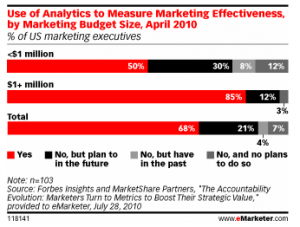An article in eMarketer caught my attention recently. Entitled “Focusing on Analytics and Accountability,” the article was a discussion about how marketers are working to establish stronger measurements to support marketing effectiveness. Although establishing success metrics is a fundamental component of our firm’s process and always has been, the concept of measuring marketing effectiveness seems to be taking hold everywhere in a more systemic way now than in the past. The development of third-party tools as well as clients’ desire to quantify how social media is truly benefiting their brand, product, or service have pushed the marketing and communications industry to evaluate and change the way we measure success and convey value to our clients.
Not surprisingly, budget size is a driving factor for many senior marketing executives in their use of analytics. According to “The Accountability Evolution,” a survey from Forbes Insights and MarketShare Partners, if a marketing budget was less than $1 million, only 50% of executives were actively using analytics, compared to 85% with budgets over $1 million. Fortunately, of those with budgets under $1 million, 30% indicated they were planning to use analytics in the future.
An interesting question is how are marketers measuring success? The answer is unexpected. Forbes and MarketShare found that online tools are the most popular for measuring success, with three of the top four directly supporting digital marketing. Independent, third-party tools such as Google Analytics and Vocus can provide valuable information to both the marketer and the client. However, it was surprising to learn that when benchmarking against goals and objectives that were developed prior to the implementation of a campaign or project, 29% of executives benchmark results against previous, similar campaigns. This approach can lead to significant errors in measuring success. Even slight variations in factors such as campaign timing, target audience, and overall approach are among a laundry list of items that could lead to an unreliable evaluation of success.
Ultimately, the Forbes/MarketShare survey found that “there still seems to be a gap between the number of marketers that are simply employing some analytics, and those that are implementing formal measurement programs—suggesting that many marketers are taking an ad hoc approach that may be failing to capture the complete picture or accurately demonstrate the value of marketing programs.” With the economy’s recovery still in doubt, it seems critical for all of us as marketers to formalize and refine our measurement approach to help convey the value of the services provided to clients both large and small — and more importantly, to help determine what works and what doesn’t, so our clients succeed in advancing their missions.
Related articles by Zemanta
- Marketing Data RoundUp: Large firms shun marketing metrics (marketingvox.com)
- Measurement and Accountability Are More Important Than Ever for Marketers (eon.businesswire.com)
- How to Use Web Analytics to Become a Better Marketer (hubspot.com)




